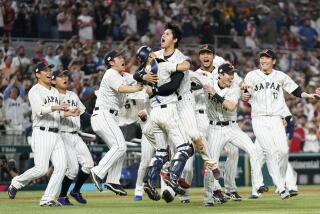Tough World Cup Testing
- Share via
To represent their countries in baseball’s first World Cup, players will have to pass Olympic-style drug tests far stricter than the ones owners have lobbied the players’ union to approve for use in the major leagues.
Under an agreement announced Monday, players will be subject to random, round-the-clock testing for steroids during the World Cup. They also will be tested for other substances banned under international rules but permitted under major league rules.
Major League Baseball officials envision the World Cup as an international showcase for the sport.
Although rules, teams and venues have yet to be decided, major league officials hope to stage the inaugural World Cup in the United States next March, presenting such possibilities as Team Canada’s Eric Gagne facing Team USA’s Alex Rodriguez and such debates as whether an American outfield of Barry Bonds, Garret Anderson and Gary Sheffield could outshine a Dominican Republic outfield of Albert Pujols, Vladimir Guerrero and Sammy Sosa.
“The drug-testing agreement allows us the opportunity to stage a true World Cup,” Commissioner Bud Selig said in a statement.
The International Baseball Federation had said it would not sanction a World Cup without Olympic drug-testing standards, and several nations, including Cuba, had indicated they would not participate without that sanction.
In the statement, major league officials said they had reached agreement with the players’ union and the IBF on a protocol under which the IBF would administer drug tests “consistent with the requirements of the World Anti-Doping Agency and the Olympic movement.”
Union executives had indicated little objection to such testing during the World Cup, since player participation would be voluntary. Rob Manfred, baseball’s chief labor lawyer, said players would be subject to testing as early as 45 days before the World Cup, adding that positive tests would not subject a player to discipline under the major league testing program.
“There will be no carry-over,” he said.
Several major league players, including Bonds and Sheffield, have recently been linked to an alleged steroid-distribution ring under investigation by a San Francisco grand jury, and the major league testing program has been criticized by Olympic officials, President Bush and several members of Congress.
The program, in its first year, calls for players testing positive for steroids to enter counseling but not to be fined, suspended or publicly identified. Selig has asked the union to accept the minor league protocol, under which first offenders are subject to an unpaid suspension of 15 days.
Under international baseball rules, players testing positive for use of steroids -- or of a wide variety of potentially performance-enhancing substances permitted under major league rules -- are suspended for two years.
Dick Pound, president of the World Anti-Doping Agency, said he applauded Monday’s agreement as “an encouraging first step” but said he regretted that owners and players had not committed to strengthen the major league drug policy along the lines of international rules.
“There’s nothing stopping them from doing that, except for their own intransigence,” Pound said.
Times wire services contributed to this report.
More to Read
Go beyond the scoreboard
Get the latest on L.A.'s teams in the daily Sports Report newsletter.
You may occasionally receive promotional content from the Los Angeles Times.







